How Does HCG Injection Help in Pregnancy?
Fertility Treatment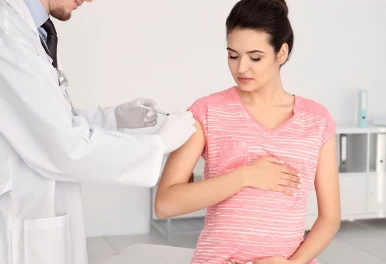
Human chorionic gonadotropin (HCG) is one of the important hormones in the female body that is naturally secreted in the pituitary gland. HCG levels, like the reproductive estrogen and progesterone hormones, change during pregnancy. Since the placenta usually produces HCG, it can stimulate ovulation, making HCG injection and pregnancy success directly related to each other.
Human chorionic gonadotropin helps with pregnancy by increasing progesterone levels. On the other hand, HCG injection is sometimes performed to stimulate ovulation along with Infertility Treatment Methods (e.g., IVF).
After pregnancy, the levels of HCG increase, making it possible to determine the pregnancy result by conducting a blood test after 11 days or a urine test after 12 to 14 days. Keep reading to learn more about HCG shots, symptoms of ovulation after HCG injection, and HCG injection side effects.
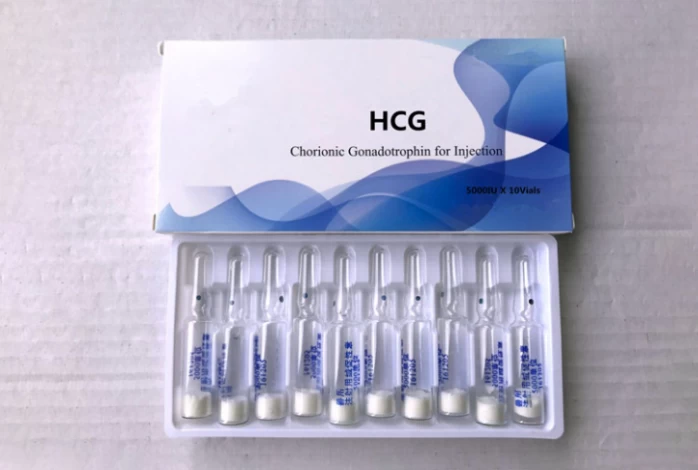
How Is HCG Produced in Pregnancy?
HCG hormone is a glycoprotein produced by the placenta in pregnant women, especially in the first pregnancy weeks, to help produce progesterone and prevent menstruation. HCG levels increase as time passes, so during the first ten weeks of pregnancy, their levels double every 48 or 72 hours.
When Is HCG Ampoule Injected?
The HCG injection for pregnancy is given under the following conditions:
- Treating female infertility;
- Treating male hypopituitarism;
- Diagnosing male hypogonadism;
- HCG injection for ovulation in IVF or IUI procedures;
- Preventing ovarian cysts, miscarriage, etc.;
- Diagnosing and treating cryptorchidism in adolescent boys.
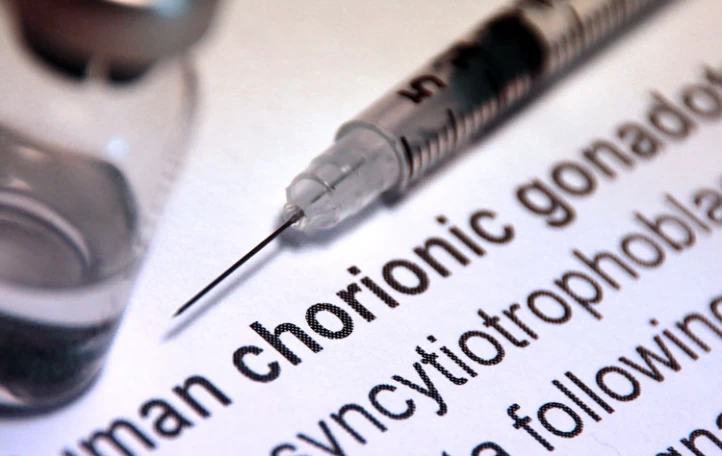
When to Take HCG Injection for Ovulation?
Depending on your fertility treatment plan and the guidance of your healthcare practitioner, the timing of your HCG injection for ovulation will vary. In general, HCG injections are usually administered after the ovaries' follicles have grown to a specific size and are prepared for ovulation. Ultrasound scans and routine hormone monitoring are typically used to determine this issue.
What Are Ovulation Symptoms After HCG Injection?
Ovulation usually occurs about 24 to 48 hours (36 hours on average) after the HCG injection. The symptoms of ovulation after HCG injection will be as follows:
- Increased body temperature;
- Increased libido;
- Spotting, brown discharge, and light bleeding due to follicle rupture;
- Abdominal bloating due to increased estrogen;
- Clear and elastic cervical mucus due to increased estrogen;
- Mild pelvic and abdominal pain;
- Breast tenderness and pain;
- Changes in the cervix;
- smell sensitivity.
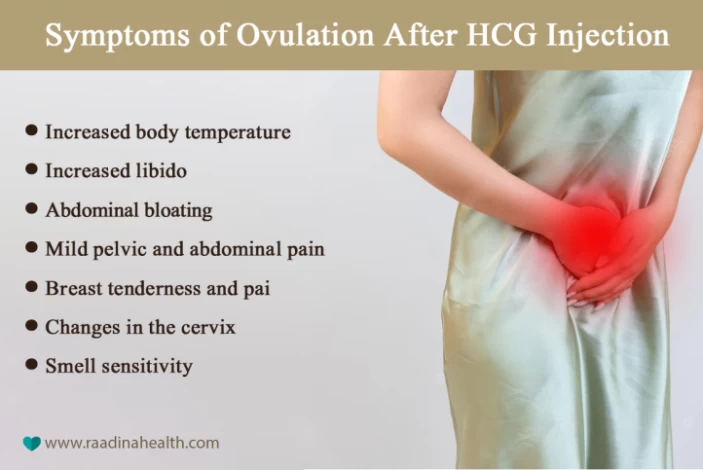
No signs of Ovulation after HCG Injection
Many wonder what happens if hCG doesn't work. First, ovulation happens 24 to 48 hours after injection (with an average of 36 hours), so you must wait for the signs of ovulation for almost two days. If you haven't had symptoms after 72 hours, your doctor probably asks for additional testing to find the cause of it. In most cases, the patient has no symptoms of egg rupture after HCG injection and doesn’t experience ovulation; the HCG level is either decreasing or rising very slowly.
HCG Injection and Pregnancy
HCG injection has a significant role in pregnancy. This drug is equivalent to luteinizing hormone (LH) and causes the normal growth of follicles, ovarian stimulation, and ovulation. LH hormone is a chemical substance produced by the pituitary gland that naturally stimulates ovulation and thus is used in IVF treatment.
Therefore, HCG injection for pregnancy, along with other fertility drugs such as urofollitropin (Bravelle) and monoterpenes (Menopur), help treat female infertility.
What are the Early Signs of Pregnancy After HCG Injections?
Due to the increased human chorionic gonadotropin level during pregnancy, pregnant women might experience light spotting, breast tenderness, mood swings, nausea, or bloating in the first two weeks.
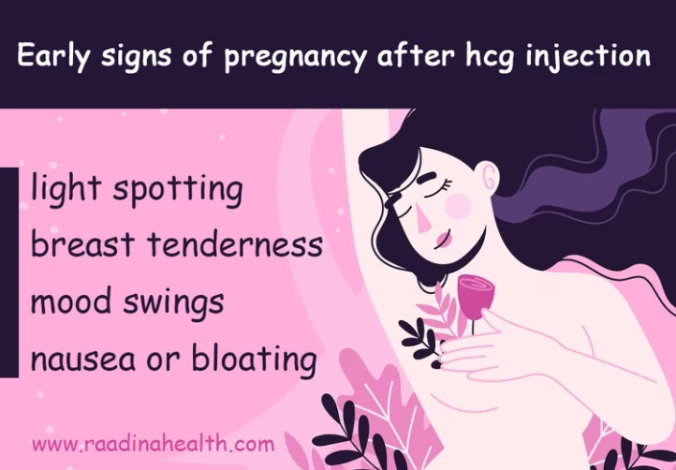
What is the Dosage of HCG Injections?
The average hCG trigger shot dosage for female infertility treatments is 5,000 to 10,000 units. Although this dosage may seem high, the medical team will provide a suitable HCG intramuscular or subcutaneous injection schedule. The dosing of HCG injection to increase sperm in men is 1,000 to 4,000 units 2 to 3 times a week for several weeks to months.
Where and How to Inject HCG?
Depending on whether the vial is liquid or powder, HCG injection is done using different techniques. Liquid HCG vials should be refrigerated immediately (within 3 hours) after being taken from the pharmacy and not be removed from the refrigerator except at the injection time. It is important to know that the non-refrigerated HCG liquid should not be injected into the body under any circumstances. However, since direct injection of HCG cold liquid usually causes discomfort, it is better to raise the temperature of the vial by holding it between hands before injection.
The powdered HCG, on the other hand, can be kept at room temperature. During injection, one should draw one cc of bacteriostatic water into the syringe, pour it into the powdered vial, and then rotate it slowly. This solution should never be prepared with tap water or mineral water.
Powder and water are mixed by gently rolling the vial containing the solution between hands. The reason is that shaking the vial may reduce HCG effects. Finally, the HCG injection is given in the desired area based on the doctor's advice after drawing the solution into the syringe and removing the air.
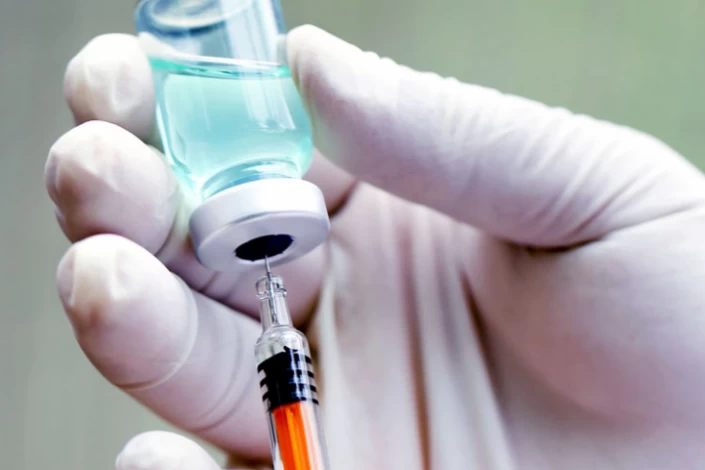
Who Should Not Take HCG Injections?
Not all people are good candidates for HCG injection. This drug should not be prescribed to people with the following conditions - except in special circumstances at the discretion of the doctor - :
- Asthma;
- Pregnancy or suspecting pregnancy;
- Epilepsy;
- Cardiovascular diseases;
- Androgen-dependent cancers, especially ovarian, breast, uterine, prostate, hypothalamus, and pituitary cancers;
- Kidney disease;
- Allergic reaction to HCG;
- Abnormal uterine bleeding;
- Hormonal disorders;
- Drug sensitivity;
- Thyroid or adrenal gland dysfunction
- Cyst in the ovaries;
- Vaginal bleeding without a known cause;
- Early puberty;
- Migraine;
- Prostate cancer;
- Lactating.
What are the Risks and Side Effects of HCG Injection?
HCG ampoule, like many other drugs, carry risks and side effects, some of which include:
- Allergic reactions (it is possible to detect by skin test before injection);
- Pain, especially sudden lower abdominal pain;
- Headache;
- Increased irritability;
- Mood swings;
- Fatigue;
- Depression;
- Ovarian Hyperstimulation Syndrome (OHSS);
- Ovarian cancer (in rare cases)
- Breathing problems;
- Inflammation of breasts, penis, and testes;
- Sudden weight gain;
- Trouble urinating or changing the amount of urine.
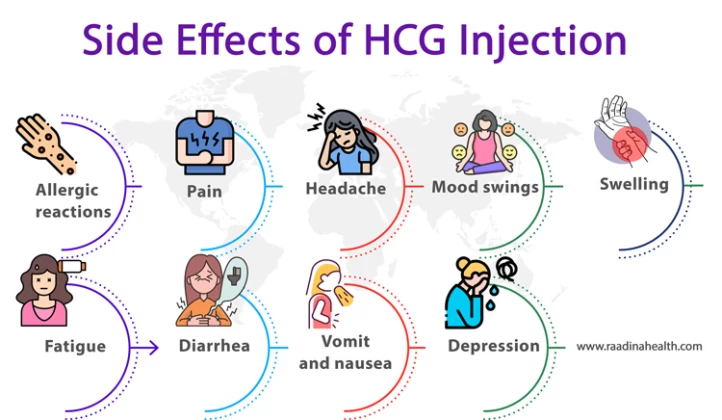
The following HCG side effects are completely normal, and you don't need to inform your healthcare provider about them:
- Acne, especially on the face and back;
- Mood swing;
- Headache;
- Facial hair growth;
- Pain or redness at the injection site;
- Upset stomach and vomiting.
What are the Risks of HCG Injection During Pregnancy?
Although chorionic gonadotropin injection shots help treat female infertility, their use is dangerous during pregnancy. The reason is that it can cause birth defects in the embryonic nervous system. Therefore, Women should stop taking HCG and inform their doctor immediately if they get pregnant or even suspect to be pregnant. Furthermore, HCG injections should not be used in higher dosages or longer periods than the doctor prescribes.
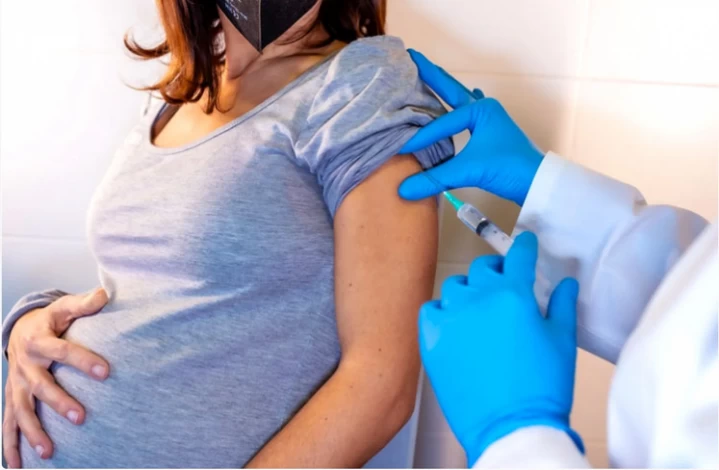
Can hCG Injection Cause Twins?
According to research, women who inject HCG can increase their chances of having twins and multiple births more than others. However, as the risks of pregnancy increase with the increased number of embryos, the patient must be fully observed by a doctor during infertility treatment as well as her pregnancy.
When to Take hCG Injection for Ovulation?
The best time to inject human chorionic gonadotropin for people who have failed to get pregnant after many attempts is during ovulation. Ovulation usually occurs 12 to 16 days before the next menstruation. Fertilization and pregnancy are possible within 24 hours after ovulation. Therefore, the doctor will first examine the follicles with ultrasound and then inject HCG injection for ovulation if the size of the follicles is suitable.
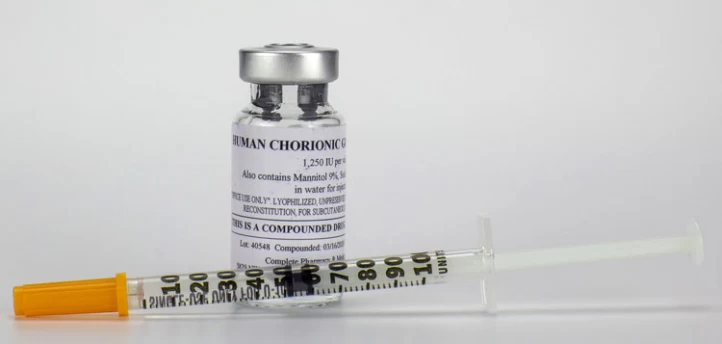
When Is the Best Time to Have Sex after HCG Injection?
According to the ovulation timeline, the best time for having sex is about 36 hours after the HCG shots. It is also better to have intercourse every other day for 3-4 days to increase the chances of pregnancy.
What If One Dose of HCG Is Missed?
It is important to stick to your schedule and not to miss any HCG dosage, but if you have forgotten one dose, you should take it as soon as you remember. However, if you remember it the next day, skip the missed dose and continue your injections as planned. Remember that taking double doses will imbalance your hormones and cause more difficulty, so contact your doctor or health care professional and ask for help if you forget a dose.
HCG Hormone and False Positive Pregnancy Tests
As HCG Injection increases the HCG levels in the body, it may sometimes result in false positive pregnancy tests. In other words, the HCG level is very high for about a week after the HCG injection, so a positive blood test does not necessarily mean a positive pregnancy.
However, the pregnancy test result gets closer to reality when the extra amounts of HCG leave the body after at least 10 to 12 days. Therefore, the best time to perform a pregnancy test is about 2 weeks after fertilization.
HCG Injection and Pregnancy Success Rate
The chances of pregnancy after HCG injection depend on the level of your natural hormones, how well your body reacts to the HCG, and what method of artificial insemination is used in your treatment. Recent studies have revealed that if HCG injection for pregnancy is injected 42 hours before IUI, the chance of pregnancy increases by 10%. In natural pregnancy also, HCG shots increase the pregnancy rate by 50%.
Reasons for Not Getting Pregnant after HCG Injection
Not getting pregnant after an hCG injection is a rare condition. However, it may still happen due to various reasons such as high androgen levels in the mother's body, poor sperm and semen quality, a problem in the female reproductive tracts, having too much anxiety or depression that negatively affects the hormones, and not getting enough HCG units.
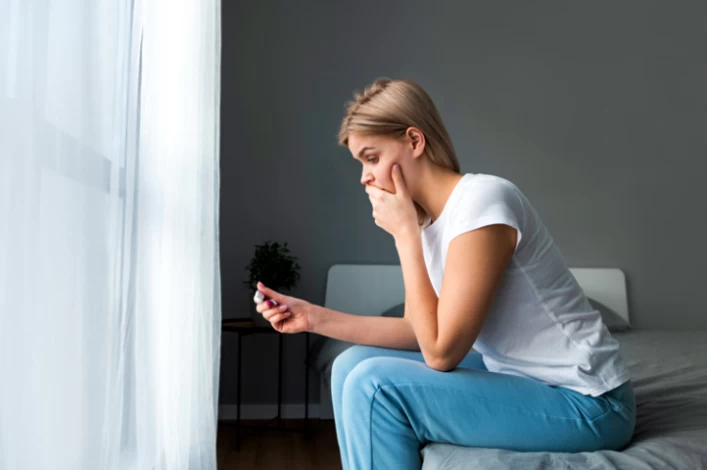
Contact us for a free initial consultation about Infertility treatment
Frequently Asked Questions
1) What are the early signs of pregnancy after HCG injection?
The early signs of pregnancy after HCG injection emerge 7-8 days after getting it. Cramping, bleeding or spotting, bloating, headaches, dizziness, and skin rash are the first symptoms you face when pregnant.
2) How long does the egg rupture after HCG injection take?
It takes almost 36 to 46 hours for the egg follicles to rupture after an HCG injection. The main symptoms of egg rupture are sudden pain in the abdomen, which worsens, and pain in one side of the body.
3) Does HCG injection cause ovarian cysts?
As mentioned, the main purpose of the hCG trigger shot is to stimulate ovulation. This can increase the size of the follicles (due to the release of the most mature egg) and enlarge the ovaries. Therefore, there is a risk of ovarian cysts.
Many enlarged follicles do not release or do not have eggs; therefore, their accumulation in the ovary can produce small and large ovarian cysts.
4) What is the reason for two simultaneous HCG injections?
Sometimes, two HCG shots are given at the discretion of the doctor. This administration method is not the same for all patients and depends on the number of necessary injections, treatment length, HCG dosage, etc. The two injections can either be given separately or simultaneously with one syringe.
5) What is the difference between HCG and HMG injections?
The HMG injection can help the growth and maturation of the eggs and does not affect egg release; HCG injection is given to stimulate ovulation and release eggs.
6) Do HCG shots cause false pregnancy?
There is still no research on the increased risk of false pregnancy after an hCG trigger shot; however, observations show that the risk of false pregnancy in women who have done HCG therapy is higher than in others.
7) Can men get HCG injections?
HCG shots for men can treat hypogonadism (low testosterone production). The increased HCG levels can stimulate testosterone production, increasing sperm counts in men. Therefore, HCG Injections can be very effective when a lack of sperm causes male infertility.
8) How many days after the HCG injection can I test for pregnancy?
You can take a pregnancy blood test 11 days after the hCG shot and a urine test 12 to 14 days after getting them. Keep in mind that blood tests are more accurate and reliable.
9) How many hCG injections are needed for ovulation?
When the follicles are 15-18 mm, the doctor suggests 5.000-10.000 intramuscular shots of hCG to trigger ovulation and improve hormone production both in men and women. In most cases, the patient has to take hCG shots three times a week.
10) Is hCG injection good during pregnancy?
HCG shots help produce more mature egg follicles and adjust pregnancy hormones. However, taking hcg injection during pregnancy is not recommended as it may result in developing ovarian hyperstimulation syndrome and birth defects.
11) What happens if hCG injection is given after ovulation?
If an HCG injection is given after ovulation, it won't induce ovulation as it typically would if administered prior to the release of the egg. Instead, the HCG hormone may support the luteal phase by stimulating the corpus luteum to produce progesterone, which helps maintain the uterine lining and supports early pregnancy if fertilization has occurred. However, timing HCG injections post-ovulation is generally not standard practice, as its primary use is to trigger ovulation and enhance the chances of conception by coordinating the release of the egg with fertility treatments.
12) What is the purpose of administering an HCG 5000 injection in early pregnancy?
An HCG 5000 injection, or similar dosage, administered in early pregnancy is typically used to support the corpus luteum and maintain progesterone production. This hormone support is crucial in the first trimester to sustain the uterine lining and ensure a healthy environment for the developing embryo. It may be recommended in cases where there's a history of recurrent miscarriages or when there's a concern about adequate progesterone levels. It's important to follow medical advice closely regarding the timing and dosage of HCG injections during early pregnancy to support a successful pregnancy outcome.



 WhatsApp
WhatsApp
 Telegram
Telegram
 Facebook
Facebook
 Email
Email

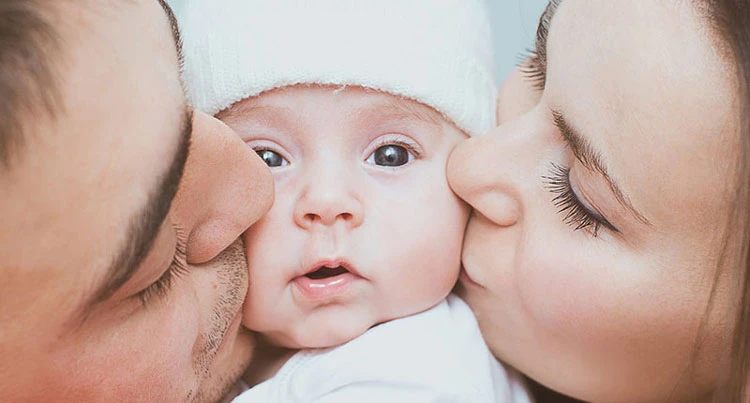
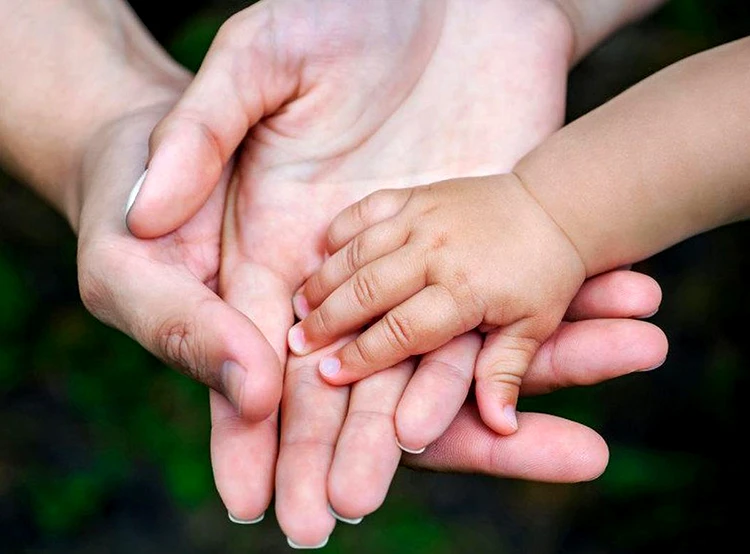
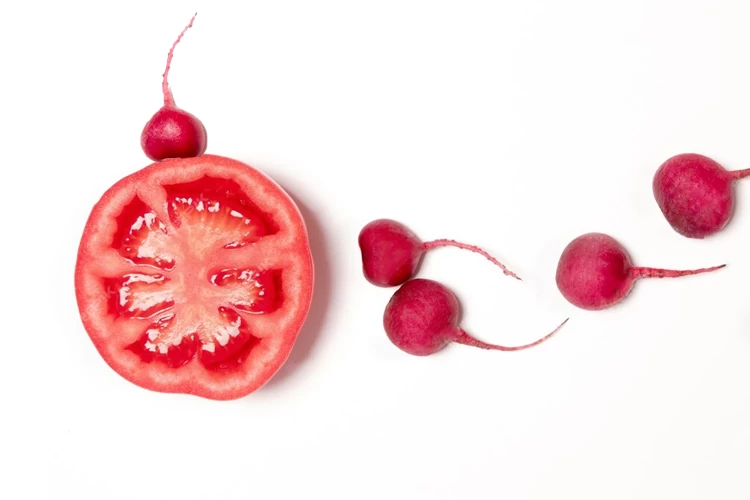
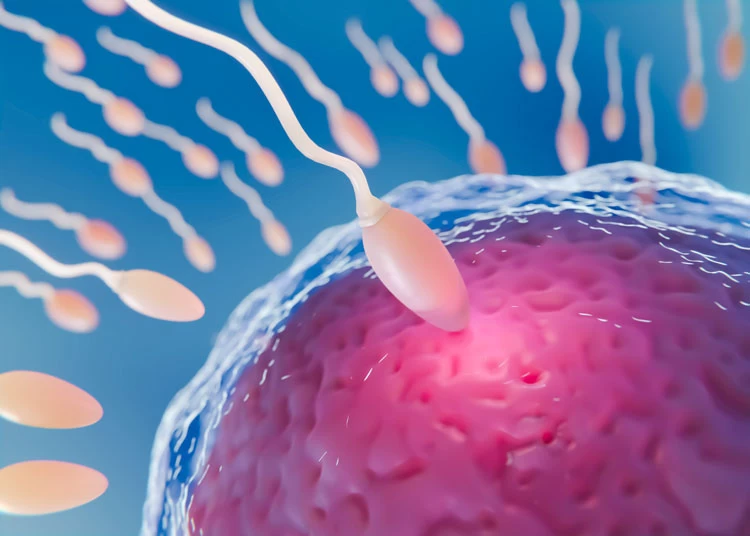
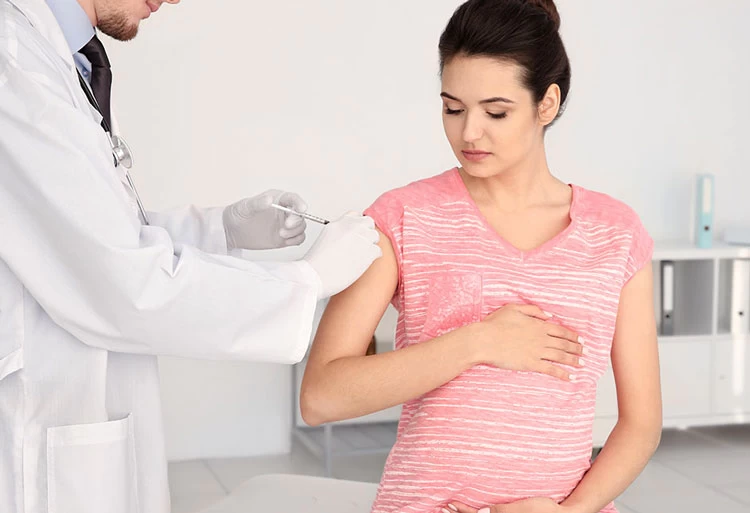
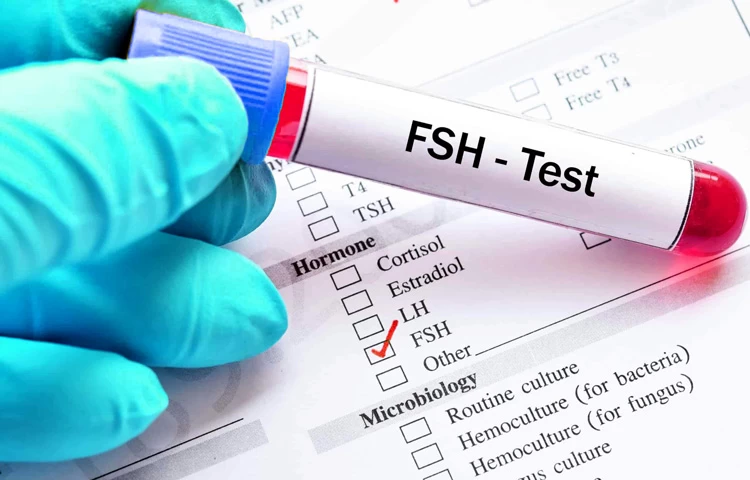
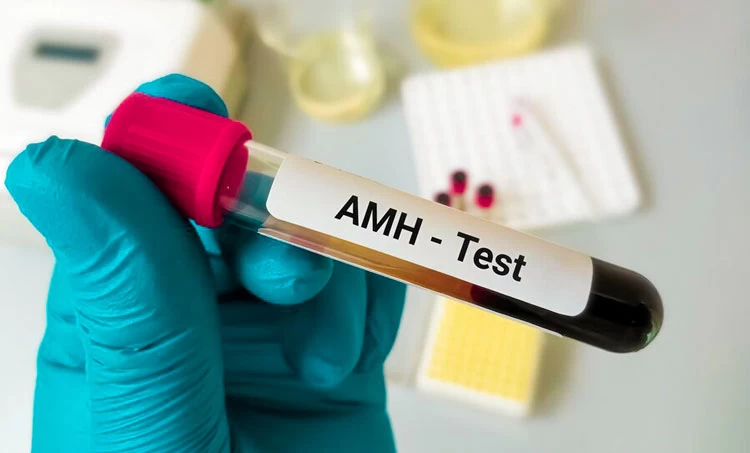

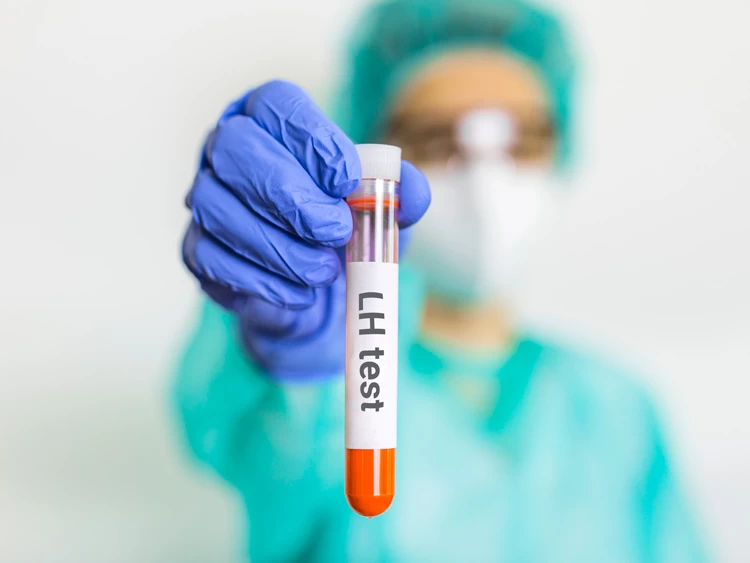
User
-How soon after receiving an HCG 5000 injection should I check for pregnancy?
Habib Ebrahimi
-It is advised to wait at least 14 days after getting an HCG 5000 injection before testing for pregnancy. This waiting period gives enough time for a reliable pregnancy test result and for the HCG hormone to be detected in your system.
User
-At least after 14 days